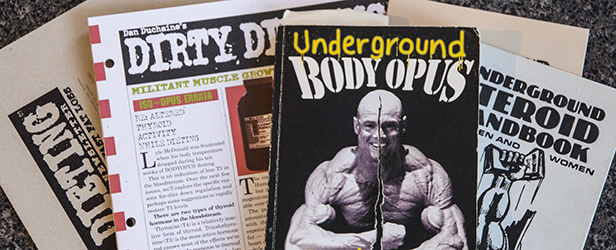
Dan Duchaine (1952–2000) might have been the first “geeky” guru in the lifting business, and given the fact that his escapades in dealing, designing, and manufacturing AAS and other drugs would be at home on HBO or AMC, he might also be the most interesting. Duchaine’s failures as a bodybuilder (both natural and enhanced) led to his interest in androgens, an interest so strong that he essentially taught himself how to become a specialized chemist in the field. His seminal guide The Underground Steroid Handbook was a self-published bestseller in the bodybuilding world and precise enough to gain “fans” in the world’s sport testing bodies.
Duchaine was also a true innovator on the dietetics front—you can still see his fingerprints all over today’s carb cycling diets. His only monograph on the topic was his Underground Bodyopus: Militant Weight Loss & Recomposition (1996.) Much like his other works, Bodyopus was a cutting edge piece of work that melded his experiences and the latest research together into a text that still holds up and offers programming that, in many ways, is superior to much of what we see today.
Let’s look into this fantastic yet under-appreciated guide...
“And then there’s…the others. They ask for advice but what they actually want is my approval of what they are determined to do” (page 70).
Wanting affirmation of what you’re already doing is a natural thing that any coach or trainer has come across. Here, Duchaine is referring to a hypothetical client's hope to have his strong belief in a fish and rice diet confirmed, though I’m guessing that anyone who’s ever been “asked a question” in a gym has dealt with this concept. For the professionals out there, breaking your clients and/or athletes of this habit is critical.
“Most weight loss failures have nothing to do with glands, large bones, genetics, or bad diets. When trying to change their eating habits, most people have trouble developing the discipline to overcome to key problems: hunger and anxiety...I’m not going to discuss hunger and anxiety in BODYOPUS. I’m assuming that you have this under control. I’m not interested in being a parent, psychologist, or babysitter. I’m a body problem-solver, not a head fix-it man” (pages 43–44).
When Duchaine wrote this passage, debate over the effects of genetics on an individual’s levels of self-control was just becoming a hot topic. Not surprisingly, the subject of behavioral genetics has only grown in the eighteen years since Bodyopus was published.
Epigenetic studies have shown strong connections between poor care during infancy and later life problems with stress, parental eating habits during pregnancy and the late life health of resulting children, and connections to maternal stress in utero resulting in children’s anxiety issues later in life. Because DNA methylation (the “cause” of epigenetic changes) is easy to spot, these correlations are very strong.
It seems odd for a culture that has accepted the concept of genetic limits in hypertrophy to sometimes carelessly call willpower the key criteria for weight loss. Willpower may very well be the critical element of weight loss, but at the same time, willpower itself might be largely inherited.
“Good bodybuilding coaches don’t need hard numbers. A trained eye and a smart mouth will say, ‘You’re too far out. You’re behind schedule. You’re not going to make it because you’re not lean enough, and you’re losing too much muscle.’ Coaches don’t need devices because they have an astute awareness of size, shape, and leanness. Ultimately, a bodybuilding contest is judged visually, not with body fat percentages” (page 35).
In nearly every sporting endeavor, metrics at some point give way to the eyeball test. When you’re on the platform, completing your lift is a matter of your innate connection to your body, not your max from a few sessions back. On the stage, no judge is going to break out the calipers on you. On the field, your forty doesn’t matter one whiff when there’s a guy across from you looking to smack you in the face.
“Your body’s thermostat adjusts itself to the amount of carbohydrates and proteins that you eat...By replacing dietary fats with these 'thermogenic' foods, your body temperature will raise slightly, enabling you to burn fat more quickly” (page 59).
The role of macronutrients on the thyroid isn’t all important, but it is critical to understand, especially for physique enthusiasts and athletes. Just as critical is having a balanced view of how macros work. Bodyopus might be the most evenhanded diet tome of its era. In some ways, it’s funny to look back and see that in the span of dieting ideology that was torn between low-fatters and Atkins acolytes, perhaps the most reasonable approach was penned by a felonious autodidact.









